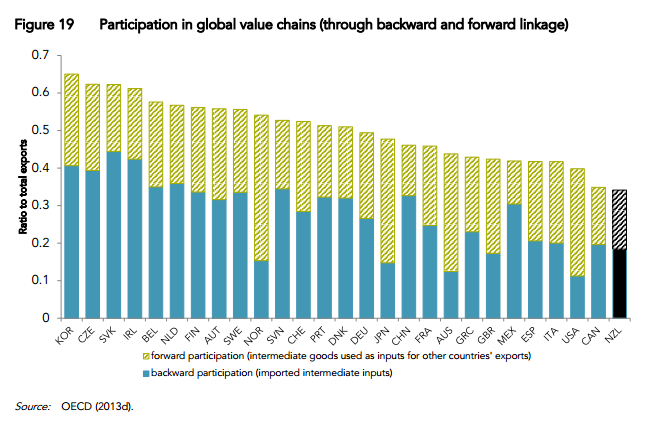Yesterday I went through the story of how an Aussie company looked to get protection against imports of tinned peaches and tomatoes, and was shown the door by the Aussie trade authorities, whereas here in New Zealand Heinz Wattie's successfully managed to keep the same South African tinned peaches at bay when MBIE once again renewed anti-dumping provision against them.
The Aussie authorities were right: righter than Maggie Thatcher turning right in Wrightington. It was always a protectionist absurdity that 23.5 million Australians should have to pay over the odds for their peaches just so that 3,000 SPC Ardmona employees should have guaranteed jobs (and cushy ones at that, as documented
here). And that tends to be the stitch-up that lies at the heart of a lot of protectionism - damages spread thinly over large populations, benefits concentrated on the favoured few.
That's something that should give even anti-trade activists pause for thought. Even if you are way down the protectionist end of the political spectrum, you might want to ask whether dearer food, shoes and clothes for the whole of lower and middle income New Zealand is a price worth paying to maintain much smaller groups of manufacturing employees in their comfortable lifestyle.
And while this is an argument of no economic merit whatsoever, I'm going to make it anyway, since the anti-trade lobby tends to include assorted anti-globalisation and xenophobe loonies who might buy into it. How do you feel about import protection for those poor threatened workers on the SPC Ardmona cannery line - when the company is actually a subsidiary of Coca Cola? And even if you weren't a loony, you'd reckon that companies the size of Coca Cola can look after themselves, thanks very much, without also being granted an official licence to rip off the Aussie consumer.
In any event, there's a happy ending.
SPC Ardmona, reeling under the impact of these dastardly cheap imports, asked for A$50 million in government assistance ($25 million each from the Federal government and from the state government of Victoria). No dice.
End of terminally endangered company? Not quite.
One fan of SPC product, alarmed that it might disappear, started an online promotion campaign that hit a nerve in Australia, and went viral. The whole story's
here (and lots of other places). Sales soared, Woolworths decided it was worth stocking more of the iconically popular brand, and SPC was back in business, with the CEO saying “I'm not being cute when I say this, but the refusal of that $25 million from the Commonwealth, it triggered this huge response from the public and that’s led to Woolworths saying the customer is right". At the risk of overkill, I'll just add that a bit of smarter marketing was always a better option than either the protective moat or the handout.
The heading to the post mentions two happy endings: here's the other one. Happy-ish, anyway: there are some good bits in the bag, and hopefully more to come.
The outright good news is that, in the Budget,
the government suspended anti-dumping provisions that had been in place against various construction materials, and it did it for the very good reason that it would make the Canterbury rebuild cheaper and more competitive. You might well wonder why what's good for the Canterbury goose isn't good for the national gander, and why the rest of us have to put up with overpriced peaches and diaries (I'm not making this up, Chinese and Malaysian diaries are also apparently threats to the national welfare). But in any event it's another small victory for freer trade, even if it's only a temporary, three year, suspension of the anti-dumping provisions, so let's bank it.
The other goodish news is that the suspension of the construction materials barriers triggered a review of the whole anti-dumping shemozzle, and MBIE has come up with
a discussion paper, where it usefully gives marks to three policy options.
Option 1 is the status quo (meh, 14/30). Option 2 is a clunky thing that to me is there to make up the numbers (though with 19/30 even clunky alternatives beat the status quo). Option 3 is the only thoroughbred in the race (25/30). This allows for discretion not to impose anti-dumping duties "where they substantially lessen competition" (as they often do) or "where negative impact on another party [like you and me as consumers] outweighs harm to domestic producer" (which again will often be the case).
Free trade often struggles to prevail against producer interests, but even so this should be the easiest, "where do I sign", shoo-in of a policy contest that's ever been run.







